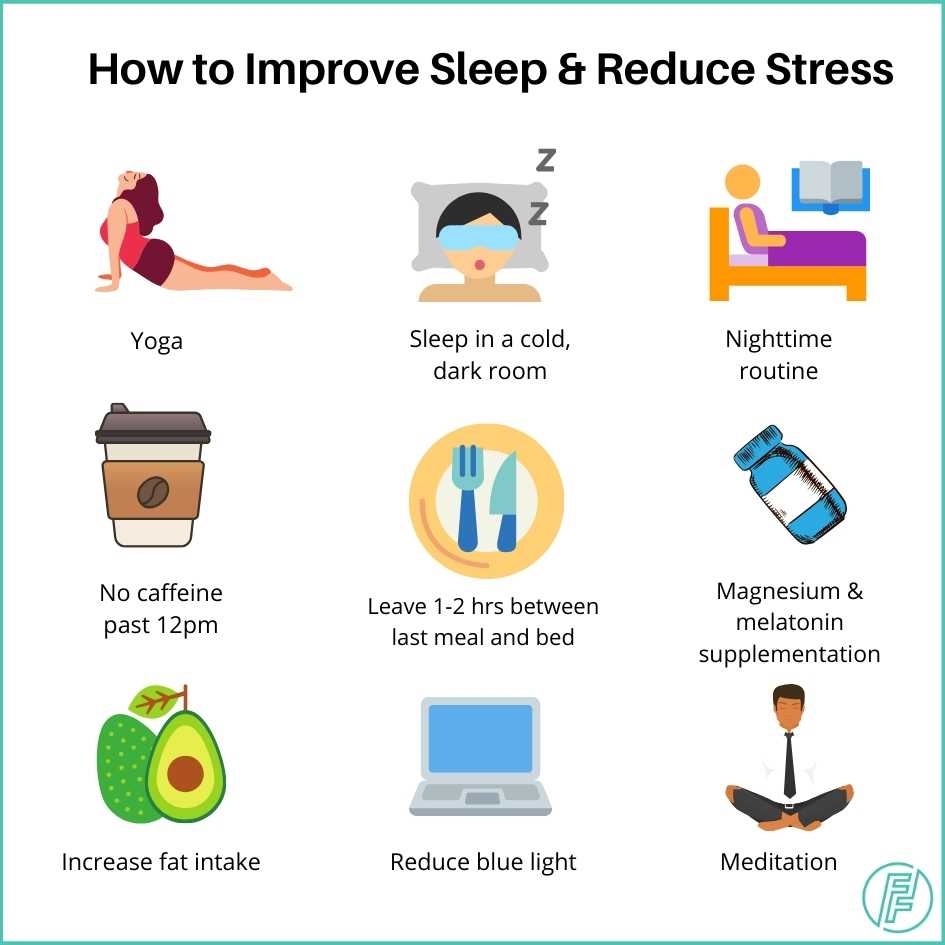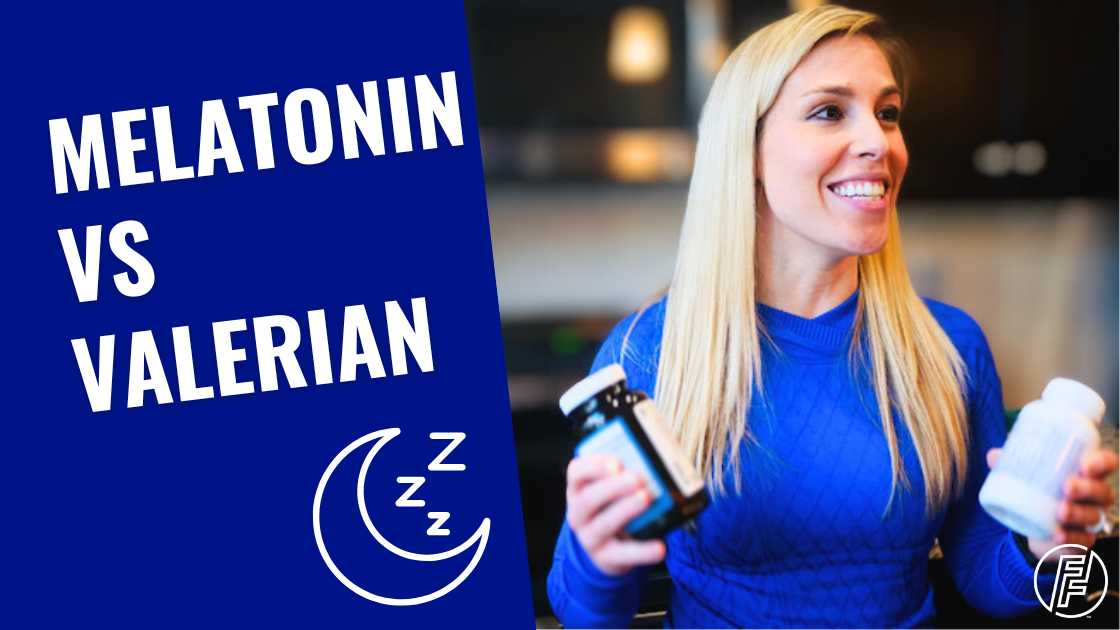Are you confused about choosing between melatonin and valerian to overcome sleep issues? In this post, I will outline the major similarities and shocking differences when comparing melatonin vs. valerian.
While both can help sleep, there are essential differences you should know to use them properly and avoid waking up groggy.
In working with our team of 3 dietitians, analyzing the research, and personally testing many supplements, I can give you a professional perspective on how to compare melatonin vs valerian.
In this post, I will share 5 science-based facts comparing melatonin vs. valerian and outline commonly recommended dosages and our top recommendations for supplements to fall asleep faster and wake up feeling refreshed. Let’s get started!
Table of contents
- 1. Melatonin is an Antioxidant With Multiple Benefits
- 2. Valerian Rarely Causes Grogginess
- 5. Melatonin Supplementation Effectively Alleviates Jet Lag Symptoms
- How Melatonin Works
- How Valerian Works
- 1. Limited Research on Long Term Effects and Benefits
- 2. Production of Certain Potential Side Effects
- 4. Not Recommended in Pregnant Females & Certain Health Conditions
- 5. Interaction of Drugs with Other Medications
- When Should You Take Melatonin for Sleep?
- Why Melatonin Dosages Can Vary So Much
- The Best Supplements to Fall Asleep Faster:
- Summary
5 Science-Based Facts on Melatonin vs Valerian
As a biohacker leading a team of 3 skilled dietitians performing virtual nutrition coaching for elite athletes and executives, I have more knowledge than most on how to succeed in achieving some quality Z’s.
Are you interested in seeing if health coaching is right for you? We offer a 👉free 15-minute strategy call👈 to map out a plan for working together so you can see the transformation that can be achieved in your life.
Additionally, our team’s experience with supplements is hard to beat. We’ve tried, tested, and analyzed the best supplements out there and have been doing so for over a decade. We help our clients determine the right supplement for their unique needs every day, so we’re uniquely qualified to choose the right one when it comes to melatonin vs. valerian.
The most important thing to know is that each person’s body will metabolize each supplement differently. This is not a one-size-fits-all supplement, and the effective dosage for each person may be vastly different.
Although these supplements both induce sleep, we have 5 super important science-based facts that will suggest which one is more effective for you.
1. Melatonin is an Antioxidant With Multiple Benefits
Melatonin is an antioxidant that protects the body from free radicals.[1] These free radicals cause oxidative stress, inflammation, and fatigue, which can cause a wide spectrum of problems, from prolonged workout soreness to neurodegenerative diseases. The extent of the problems free radicals cause depends on their amount, how long they have been elevated for, and your unique DNA.
Oxidative stress occurs when your body is affected by Reactive Oxygen Species (ROS), a certain type of free radical.
Reactive oxygen species are leftover products of your body’s metabolic processes. If you have too many of them in your body, the antioxidants will not be able to get rid of them. As a result, there will be increased inflammation and disease.
Now, if you know that, we can quickly understand what melatonin is doing here.
One of the major benefits of the hormone melatonin is that it protects cells from oxidative stress!
How?
Melatonin neutralizes these harmful ROS molecules before they damage cells, which means melatonin protects cells by reducing the inflammation that can interfere with standard sleep patterns.[1]

2. Valerian Rarely Causes Grogginess
While comparing melatonin vs valerian, we learned an interesting fact about valerian.
Do you know that compared to melatonin, valerian causes less grogginess?
Yes, by increasing GABA levels in the brain, valerian doesn’t lead to daytime sleepiness, has more soothing effects, and acts as a natural sedative.[2]
3. Valerian is a Root, and Melatonin is a Hormone
While both valerian and melatonin promote restful sleep, they differ in their origin, chemical composition, and mechanism of action.
Valerian is an herb with a long history of common use in Western Europe.
Melatonin is a hormone. It is naturally produced in the body and released from the pineal gland. It operates based on the brain’s circadian rhythm and makes us calm and sleepy.
4. Melatonin Supplementation Does Not Effect The Body’s Production of Melatonin
Most hormones, such as testosterone, cause the body to stop producing itself when taken from external sources. This is usually referred to as taking an endogenous source of the hormone (endogenous = outside the body). However, the situation varies in the case of melatonin.
Unlike hormones like testosterone, melatonin doesn’t signal the body to stop producing hormones if taken from an exogenous source.
As a result, melatonin supplementation does not affect the body’s own capability for the natural release of hormones from the pineal gland.
5. Melatonin Supplementation Effectively Alleviates Jet Lag Symptoms
By adjusting the body’s natural internal clock to a new time zone, melatonin effectively improves jet lag symptoms.[3]
Melatonin helps travelers quickly adapt to a new time zone without any nuisance by using this supplement during travel.
So when your body clock is ticking to a different time zone, melatonin works marvels!

Which is Better for Sleep Melatonin or Valerian Root
When it comes to better sleep, considering a specific supplement is tricky. This is because each supplement is distinctive in its own way.
To make this easier, we’ll discuss the different effects of melatonin and valerian supplements. Let’s start with melatonin.
How Melatonin Works
The standard sleep duration to fall asleep ranges from 15 to 20 minutes. If a person takes melatonin, sleep latency is reduced.[4]
Sleep latency is the duration of falling asleep once someone begins lying down.
According to an observation, melatonin may decrease your sleep latency by up to 4-7 minutes. Additionally, melatonin also increases sleep efficiency and sleep duration.[4]
One important thing to note is that melatonin isn’t too effective in stage 1 and REM sleep. But if you need sound sleep, melatonin can be a good option to enhance it.
How Valerian Works
Valerian, compared to the hormone melatonin, is a herb that exhibits various pros and cons when it comes to sleep. The primary chemical constituents of valerian include monoterpenes, bornyl acetate, sesquiterpenes & valerenic acid. These are the secret key ingredients behind valerian activity in inducing sleep.[5]
Valerian’s sleep-aid activity lies behind these key ingredients, and this is how they work.
Valerian induces the breakdown of GABA in the brain. GABA, also called gamma-aminobutyric acid, is a neurotransmitter that produces a calming effect. The neurotransmitters inhibit the wake-promoting neurons and activate the sleep-inducing neurons.[6]
Valerian also destroys the enzyme that inhibits the release of GABA. As a result, GABA levels increase in the brain, and you fall asleep quickly and achieve more restful sleep.
There is another magical effect of valerian root caused by valepotriates.
Valepotriates found in valerian have anxiolytic effects, which means they also relieve anxiety by suppressing alertness.
So, if you are searching for serene sleep, valerian is a good option. It reduces anxiety levels and enhances sleep quality.
Bottom line: Valerian does more to induce a calf feeling to prepare for sleep, it does not make you feel sleepy. Melatonin will help you feel tired and fall asleep faster.
But beyond those benefits, it’s important to use Valerian and melatonin properly under the supervision of a health care provider. They can, on rare occasions, produce adverse effects, and dosage may vary from person to person.
It’s advisable to know the cons of the herb and hormone. We provide individualized virtual health coaching and help determine if these are the right supplements for you.
What are the Cons of Taking Valerian Root?
Studies suggest that valerian is effective for short-term use. However, long-term use and high doses of valerian can produce negative effects.
Though less common, according to the National Institute of Health cons of valerian root supplements may include:
1. Limited Research on Long Term Effects and Benefits
According to a few clinical studies, valerian causes significant improvements in sleep with a potential reduction in sleep problems and increased sedative effects. However, there is limited research. Therefore, more studies need to be conducted to determine the efficacy of valerian, including the pros and cons of long-term use.
2. Production of Certain Potential Side Effects
While valerian is considered an effective medicine for improving sleep quality, it can produce various side effects.[7] These include:
- Headache
- Dizziness
- Allergic reaction
- Gastrointestinal disturbance
- Clumsiness
- Nightmare awakening
3. Delayed action
Unlike other sleep aid drugs like supplemental melatonin, valerian does not abruptly induce sleep. It works more but inducing ga calm effect to prepare someone for sleep.
After several weeks of regular drug administration, it may have greater benefits, suggesting the benefits are cumulative or lead to a change in sleep patterns.
4. Not Recommended in Pregnant Females & Certain Health Conditions
Despite producing an essential role in sleep and being sourced from herbs, it’s not recommended for pregnant females due to a lack of research. Consumption of drugs by pregnant females without known side effects can be unsafe for them, fetuses, or infants.
Valeria is also not recommended for patients suffering from liver diseases or other mental health conditions.
5. Interaction of Drugs with Other Medications
Do you have the misconception that herbal supplements don’t interact with medication?
Some may think you can take herbal supplements without any concern because they’re natural products.
Unfortunately, we need to debunk this myth. Herbs can occasionally negatively interact with medications, and Valerian is one that is known to do so.
Research suggests this natural sleep supplement can interact with other medications, herbs, and sedatives.[7]
Which things does it interact with specifically?
Among certain medications, valerian usually interacts with benzodiazepines (the anxiolytic & anti-seizure medications), barbiturates (central nervous system depressants), anti-allergy drugs, antifungal medicines, and other sedatives.
Valerian also interacts with herbs and natural products like St. John’s wort, kava, and melatonin. Some of these interactions may be benign. It is best to talk with a qualified healthcare provider to determine if the interactions are worrisome.
How Much Melatonin is Recommended for Sleep?
Melatonin is a hormone that directly impacts the circadian rhythm to improve sleep quality. The recommended dosage often ranges between 0.5 and 10 mg, though some in the ultra-wellness community, such as biohacker Dr. John Lieurance, suggest it may be higher.
Depending on the individual and how well the supplement is processed, the dose can be increased slightly to enhance the speed of falling sleep and sleep quality.
When Should You Take Melatonin for Sleep?
According to experts, the best time to consume melatonin is 30 minutes and up to 2 hours before sleep.
It is recommended that melatonin be started at a low dose of 0.5mg-2mg and slightly increased to the desired effect. Make sure not to take more than necessary or too late at is may cause increased morning grogginess:
Pro tip: Many experts suggest that seeing natural sunlight in the morning can reduce or eliminate the grogginess associated with melatonin in the morning.
Personally, I feel best when taking 0.5-1mg, and I notice increased grogginess when taking more. However, we do have clients that can take high dosages of 25mg and more to achieve great sleep without the grogginess.
Why Melatonin Dosages Can Vary So Much
The dose of melatonin varies according to age, weight, and other conditions.
Here are a few facts about melatonin to keep in mind:
- Older population must take melatonin at low doses and should not take it for an extended period. The usual dose of melatonin for achieving adequate sleep in the older population is 1-6 mg.[8]
- The dose of melatonin for middle-aged people should be 1.0mg, administered 2 hours before bedtime.[9]
- For children who weigh 40kg (88lbs) or less, the dose is 3mg and 6mg for children weighing more than 40kg.
You’ll be amazed to know that there are other specific conditions in which the dose of melatonin is different. For example, if someone is taking a melatonin supplement for jet lag, a dose of 0.5 to 5mg is suggested.
Unless under the supervision of a health professional such as our performance dietitian nutrition coaches, the important thing is to take melatonin within the recommended dose and, if possible, avoid taking it for long periods.
Though we have not encountered this personally, it is reported that melatonin can produce unwanted side effects. We have listed the most common side effects of melatonin, including:
- Drowsiness
- Migraines
- Agitation or hyperactive behavior
- Lightheadedness
- Bed-wetting
- Increased sleepiness
- Nausea
Bonus tip by our experts: never take melatonin supplements with alcohol and caffeine. Taking it with any of them can disrupt your natural body’s circadian rhythm. and sleep stages
How Much Valerian Root is Recommended for Sleep?
Valerian root is a complementary supplement for treating insomnia, relieving anxiety, and addressing other sleep-related issues.
However, the dose of this natural supplement varies according to different factors. Valerian root can be taken as tea, tinctures, or supplements, so the dose varies according to different forms.
Similar to medications and melatonin, the dose of valerian can vary based on factors such as age, weight, and health status.
The recommended dosage for valerian root is 300-600mg.[10] When possible, try to take the minimum effective dose and avoid high doses. This will help minimize undesirable reactions in the body.
Kylene, Julia, and Abby, our performance dietitian nutritionist coaches, suggest taking Valerian root at a low dose. Then, pay attention to the effects of the supplements on your body and observe how your body responds to them at that relevant dose.
We have had some clients say they noticed no change in their calmness, speed of falling asleep, or quality of sleep with taking Valarien. However, others notice a remarkable difference. The response is highly individualized.
When possible, try to use a sleep tracking device or the metrics on a Garmin, Aura Ring, or Apple Watch to see if there is a measurable change in your sleep quality.
If you feel any changes, such as improvement in sleep quality or lower anxiety levels, continue taking it. But if you don’t feel any change, increase the dose by 100mg.
Similarly, the recommended dosage can be different if you are trying valerian root in the form of tincture or tea as a natural remedy.
In The Form of Tea
The dose of valerian taken in the form of tea is 1.5-3 grams, added in 150 ml of boiling water. It equals almost 1/4th or half teaspoon of the root of the plant or 2-3 dried roots.[10]
In The Form of Tincture
Similarly, if you take it as a tincture, you can take 1-3 ml of tincture a day.[10]
However, the important factor to consider is that you can take the tincture and decoction up to three times a day. But stay below the recommended dosage; otherwise, it can have adverse consequences.
One of the awesome benefits of valerian is anxiety. If you suffer from that mental health issue, consider making a use of valerian root for relieving anxiety and its related symptoms. It’s among the best natural sleep aids that also address anxiety. While the recommended dosage of valerian for anxiety is around 200-400mg.
The Best Supplements to Fall Asleep Faster:
There are two supplements we find the most effective for falling asleep faster. One of these has melatonin, and the other does not. They both have valerian.
For those of you who would like a supplement with melatonin-only, we included our top pick, which allows quick absorption and easy adjustment of dosage.

1. Sleep Formula by Gaia Herbs
- Melatonin-free formula
- All-organic ingredients
- Works quickly with Gaia’s patented Liquid Phyto-Cap delivery system
Many of us love a sleep supplement that helps us fall asleep and is unlikely to give us any morning grogginess.
Sleep Formula by Gaia Herbs is only available through a select few distributors who carry the “Pro” line of Gaia Herbs supplements. You can have exclusive access to purchase this supplement through Fullscript, our favorite affiliate. Simply 👉create an account👈 and add it to your cart and then start saving tons of 💰💰💰 off this and future supplement purchases.
2. Best-Rest Formula by Pure Encapsulations

- Includes 1mg of melatonin per 2 capsules
- Balanced formula with valerian, GABA, Chamomile, and L-Theanine to prime the nervous system for sleep
- Made with hypoallergenic, vegan ingredients
Best-Rest by Pure Encapsulations is the sleep-enhancing supplement we’ve used most with our clients over the past 10 years. It is a balanced formula including valerian, GABA, and L-Theanine to help induce calm and relaxation to prime the nervous system for quality deep, restorative sleep.
We like that Best-Rest by Pure Encapsulations has just 1mg of melatonin per 2 capsules which is enough to help you fall asleep faster but usually will not cause morning grogginess. Many people feel it is best to take just one capsule with only 0.5mg of melatonin.
You can find Best-Rest by Pure Encapsulations through many websites online, but, you can save $5 😍 by purchasing through our Fullscript link 👍 compared to other websites. Simply create an account and enjoy the discount as long as you want!.
3. Melatonin 1mg by Quicksilver Scientific

- 1mg dosage allowed easy adjustment to the desired dosage as needed
- Uses arguably the best liposomal technology on the market
- Absorbs quickly and fast-acting because of liposomal delivery
If you want to fall asleep quicker, something else you may want is a supplement that absorbs quickly too. If this is you, say hello to Melatonin 1mg by Quicksilver Scientific!
While many companies use lipsomal technology to deliver supplements in a way that will make it through the gut without getting destroyed and increase speed of absorption, Quicksilver Scientific takes this technology to the next level.
Why?
Because they’re able to produce smaller liposomes which allow thier supplements to absorb faster than anything else on the market.
We highlighted Quicksilver Scientific as having the best liposomal glutathione supplements on the market in the past because of their liposomal technology. Fortuantely, they’ve adopted their unique liposomnal technology to a wide variety of supplements which allows for rapid absorption of supplements.
Another bonus about this amazing brand and supplement includes that because their technology allows more for more of a supplement to make it through the gut without getting destroyed, smaller amounts can be used.
Are you Intersted in buying Melatonin 1mg by Quicksilver Scientific at a discount of over $5 compared to other websites? If so, buy it now through 👉our discount at Fullscript.👈
Summary
Keep in mind that when discussing overall sleep quality, it’s challenging to directly compare melatonin and Valerian because each of them can improve sleep or treat insomnia in a different way.
Whenever we compare the efficacy of valerian and melatonin for our clients, we point out that they’re each helpful in their own unique way.
Melatonin directly influences the circadian rhythm and adjusts your sleep-wake cycle according to different time zones, making it a great option for jet lag, falling asleep faster, and improving sleep quality.
Valerian, on the other hand, is efficient in increasing the feeling of calm and preparing the nervous system for sleep.
When comparing the efficiency of melatonin vs valerian for sleep disorders, both can have positive effects but act differently for variant body conditions. Therefore, it’s essential to seek a professional guideline through a knowledgeable functional health expert who can assess your health in detail, analyze vitamin and mineral issues that may be impairing your sleep (hint: magnesium deficiency may be one of the issues), and provide individualized coaching to optimize your health.
We offer a 👉free 15-minute strategy call👈 to prospective clients who are committed to their health so we can map out a plan and show you how our approach will help you achieve the health you desire.
If you are confused about choosing the best supplement, we would suggest you utilize our 15-minute strategy call to map out a plan for 1 on 1 health cocahing. Our caring dietitians will take a detailed history and suggest to you what will be the best supplement according to your needs.
Still now sure if we’re a right fit for you? Check out our 100+ 5-star Google Reviews will show you our success with similar clients!
References
1. https://onlinelibrary.wiley.com/doi/full/10.1046/j.1600-079X.2003.00092.x
2. https://link.springer.com/article/10.1007/s12325-023-02708-6
3. https://pubmed.ncbi.nlm.nih.gov/12076414/
4. https://www.sciencedirect.com/science/article/abs/pii/S1087079204000607?
casa_token=RjqBSkqnrMIAAAAA:biSs90RTKfvFaYAK3tjGkK9qQZLvewuxNeYUukdEmfOpLTc2mCb-fQv7Jh6ueaMFyqbnyyLD0A
5. https://link.springer.com/chapter/10.1007/978-1-59745-383-7_4
6. https://ods.od.nih.gov/factsheets/Valerian-HealthProfessional/#h6
7. https://ods.od.nih.gov/factsheets/Valerian-HealthProfessional/#h8
8. https://pubmed.ncbi.nlm.nih.gov/31383052/
9. https://academic.oup.com/sleep/article/20/10/908/2726014
10. https://citeseerx.ist.psu.edu/document?repid=rep1&type=pdf&doi=c138b2324a3f84c7baa2138f272b7cc3526c2ee6








